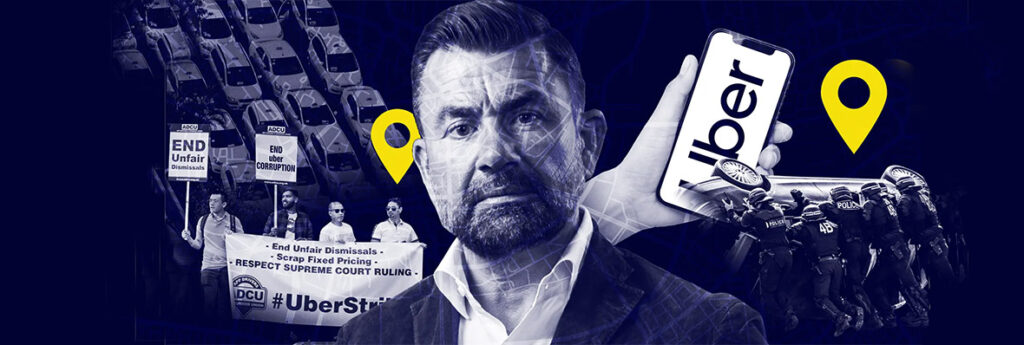As Uber aggressively pushed into markets around the world, the ride-sharing service lobbied political leaders to relax labor and taxi laws, used a “kill switch” to thwart regulators and law enforcement, channelled money through Bermuda and other tax havens and considered portraying violence against its drivers as a way to gain public sympathy, all according to a report released this week.
The International Consortium of Investigative Journalists, a nonprofit network of investigative reporters, scoured internal Uber texts, emails, invoices and other documents to deliver what it called “an unprecedented look into the ways Uber defied taxi laws and upended workers’ rights.”
The documents were first leaked to the British newspaper, The Guardian, which shared them with the consortium. Mark MacGann, a career lobbyist who led Uber’s efforts to win over governments across Europe, the Middle East and Africa, has come forward to identify himself as the source who leaked the more than 124,000 company files to the Guardian.
The Guardian revealed that when they met with MacGann he, “brought with him two suitcases packed with laptops, hard drives, iPhones, notebooks and documents.
Seven months later, they published the Uber files, “a huge project that lifts the lid on the company’s ruthless global expansion.”
“Few Silicon Valley giants have been as disruptive as Uber,” wrote the Guardian, “It spread rapidly across the world, upending taxi industries, rewriting laws and paving the way for a new, “gig-economy” model of work. The cab-hailing app is so ubiquitous that it is now a verb.”
In a written statement. Uber spokesperson Jill Hazelbaker acknowledged “mistakes” in the past and said CEO Dara Khosrowshahi, hired in 2017, had been “tasked with transforming every aspect of how Uber operates … When we say Uber is a different company today, we mean it literally: 90% of current Uber employees joined after Dara became CEO.”
Founded in 2009, Uber sought to skirt taxi regulations and offer inexpensive transportation via a ride-sharing app. The consortium’s Uber Files revealed the extraordinary lengths that the company undertook to establish itself in nearly 30 countries.
The papers show that company’s lobbyists – including former aides to President Barack Obama – pressed government officials to drop their investigations, rewrite labour and taxi laws and relax background checks on drivers.
The investigation found that Uber used “stealth technology” to fend off government investigations. The company, for example, used a “kill switch” that cut access to Uber servers and blocked authorities from grabbing evidence during raids in at least six countries. During a police raid in Amsterdam, the Uber Files reported, former CEO Travis Kalanick personally issued an order, “Please hit the kill switch ASAP … Access must be shut down in AMS (Amsterdam).”
The consortium also reported that Kalanick saw the threat of violence against Uber drivers in France by aggrieved taxi drivers as a way to gain public support. “Violence guarantee(s) success,” Kalanick texted colleagues.
In a response to the consortium, Kalanick spokesman Devon Spurgeon said the former CEO “never suggested that Uber should take advantage of violence at the expense of driver safety.”
The Uber Files say the company cut its tax bill by millions of dollars by sending profits through Bermuda and other tax havens, then “sought to deflect attention from its tax liabilities by helping authorities collect taxes from its drivers.”
The Guardian said that they approached the investigation, with the public interest in mind. “We’re looking to expose wrongdoing, to find examples of unethical or unlawful conduct – and we’re thinking, all of the time, about whether the material we have is something that the public should also know about.
“The data showed the extraordinary lengths French President Emmanuel Macron went to in order to help Uber’s lobbyist in France. It showed how the company secretly hired a political operative linked to Russian oligarchs, despite concerns that paying the lobbyist risked bribes being paid to “grease the skids”. There were countless other revelations relating to the EU, UK, US, Canada, Germany, Spain, Finland, Hungary and India.”
After MacGann identified himself as the whistleblower, Uber said, “We understand that Mark has personal regrets about his years of steadfast loyalty to our previous leadership, but he is in no position to speak credibly about Uber today.”
Responding to the investigation, Uber acknowledged past failings but insisted the company had transformed since 2017 under the leadership of its new chief executive, Dara Khosrowshahi.
In a statement, Uber said, “We have not and will not make excuses for past behaviour that is clearly not in line with our present values. Instead, we ask the public to judge us by what we’ve done over the last five years and what we will do in the years to come.”
Mark MacGann speaks out in the Guardian. Read it HERE.

